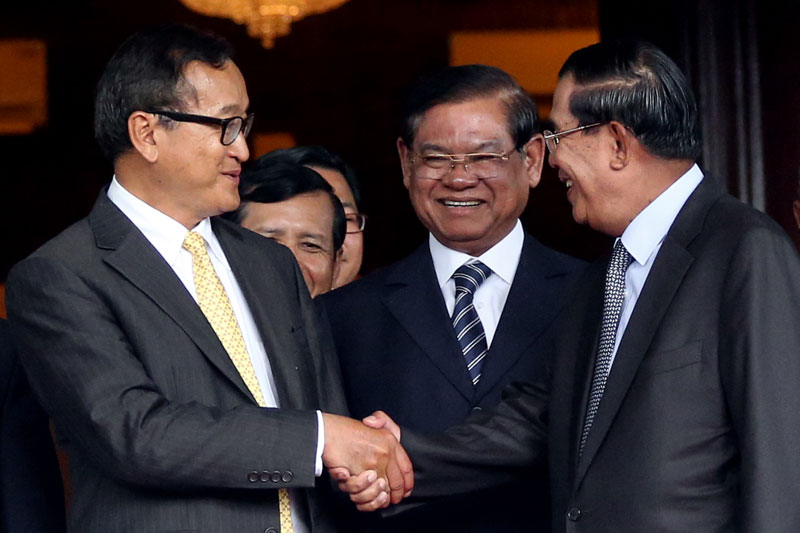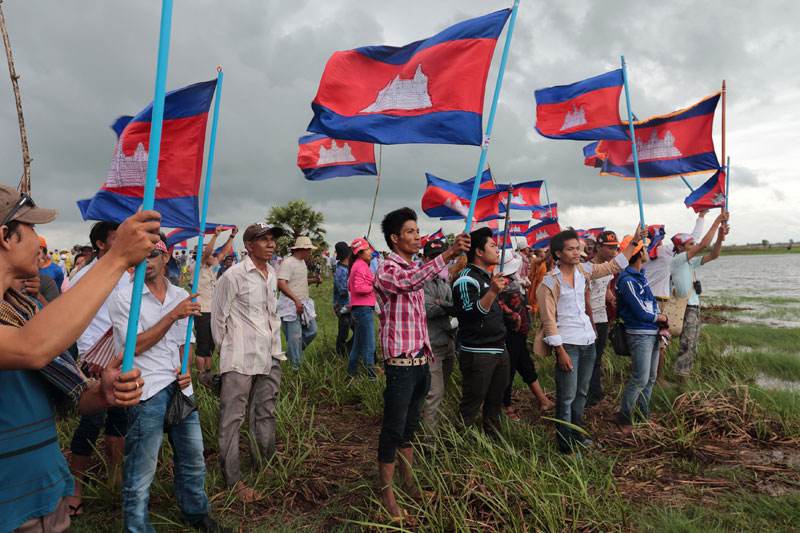Emerging from a five-hour meeting in the Senate on this day last year, Prime Minister Hun Sen and opposition leader Sam Rainsy struck a pose remarkable for its warmth after a year of growing protests demanding that the long-serving premier step down.
Standing in front of the lead negotiators from both parties, and wearing broad grins, the two leaders extended their arms and shook hands, as if the previous year of trading veiled threats of an uprising and violent suppression was forgotten.
–News Analysis

Extracting from Mr. Hun Sen a pledge—now fulfilled—to overhaul the National Election Committee (NEC) before the elections in 2017 and 2018, and also to allow a more open political environment, Mr. Rainsy ended the CNRP’s parliamentary boycott and vowed to work together with the CPP.
A year later, the new election committee is now running, the CNRP is preparing to launch Cambodia’s first opposition television station and the two parties have reached an unprecedented concord in standing up against Vietnamese border incursions.
“The deal is holding well because the main point was the NEC, and so far so good,” Mr. Rainsy said Tuesday morning. “The NEC has been formed and is functioning as expected. The second point was to end the political violence…and there is no longer an atmosphere of intimidation and fear in the country.”
While the creation of a more neutral NEC after years of contested election results and a more open political environment were the CNRP’s main goals in signing the July 22 deal, the benefits for the government have been in the taming of the opposition.
“The deal has ensured stability and security in Cambodian society but this deal is a learning process between the CPP and CNRP, and that’s why we call it the ‘culture of dialogue,’” Council of Ministers spokesman Phay Siphan said.
“We have been trying to civilize the CNRP to be like the other parties, who have the ability to act as partners.”
Koul Panha, executive director of the Committee for Free and Fair Elections in Cambodia, said that even amid election reform victories for the CNRP, a pacified opposition has made life a lot easier for the CPP.
“The problems have been the implementation of election reform, with the new election law having the risk of banning the rights and freedoms of the citizens to have an active participation in election activities,” Mr. Panha said.
He cited the CNRP’s capitulation to CPP demands earlier this year that the new election law include vague bans on people “insulting” politicians and on “bias” from NGO staff, as well as the CPP’s success this month in forcing through a new NGO law that threatens to castrate civil society groups.
“There was also no constructive dialogue on the NGO law. The CPP went ahead with the NGO law with the aim of repressing civil society, and the opposition was not able to get the CPP to listen and have discussions about that law,” he said.
“The CPP try to use any means to narrow freedom of expression. It is the reason they created the culture of dialogue, that they put those points in the election law restricting freedom of expression, and created the NGO law.”
Yet Mr. Siphan said that even with such CNRP acquiescence, some in the government have grown uneasy that opposition lawmakers have taken the CPP’s less heavy-handed approach to score political points against the ruling party.
“Some people take the culture of dialogue to serve their own interests. The CNRP used to be an opposition party but we hoped [they] would reduce their activities. We expected that they are going to modernize themselves,” Mr. Siphan said.
“For example, on the border issue between Cambodia and Vietnam, the CNRP act on their own, they have become border guards and activists only to promote themselves and provoke the people and the government,” he said.
“In this open society, the CNRP can play very smart and use this issue against the government for their own political interests, with the commune elections almost around the corner,” Mr. Siphan added. “We are concerned, but it is not time to react yet.”
Mr. Hun Sen’s government, which was born under Vietnam’s occupation of Cambodia in the 1980s, has itself pursued aggressive new stances on old opposition complaints of Vietnamese border encroachments and illegal immigration.

About a week after the July 22 deal was inked last year, Interior Ministry spokesman Khieu Sopheak said the government would consider a request from deputy CNRP leader Kem Sokha to put an end to Vietnamese migrating to live in Cambodia without documents.
“In brief, we will…make them be under our immigration law,” General Sopheak said in a July 30 radio interview. “If they come illegally, we will make them be under the law, and we cannot allow them to walk freely and disorderly.”
Since then, immigration police have rounded up about 2,500 illegal Vietnamese migrants and returned them to Vietnam. More recently, the CPP government has also sent a series of terse notes to Vietnam demanding it withdraw from various areas inside Cambodia along the eastern border.
For its part, the CNRP has sent lawmakers to inspect border encroachments while also waging a public-relations campaign over the government’s refusal to release the map of the border it uses for demarcation, in order to prove it has not ceded land to Vietnam.
Mr. Rainsy said an outbreak of violence during such a trip to the border by the opposition—like the clash during CNRP lawmaker Real Camerin’s trip to the Svay Rieng border on June 28—could threaten the life of the July 22 deal.
“I do not say from the top leaders, but some people may not be happy that the CNRP can mobilize so many people in order to raise this issue, so they may create a problem as a pretext to destroy the culture of dialogue,” he said.
“So we have to ensure there is no violation of human rights against the Vietnamese minority. Even in the context of tensions along the border, we need to be cautious and—if need be—defend against any uncontrolled elements that want to create tensions with the Vietnamese community.”
Yet Mr. Rainsy said he was hopeful that the peace with the government since last year’s deal can last.
“We have to remain reasonably optimistic. Let’s hope. We are doing our best not to give any pretext to anyone to crack down on us.”



